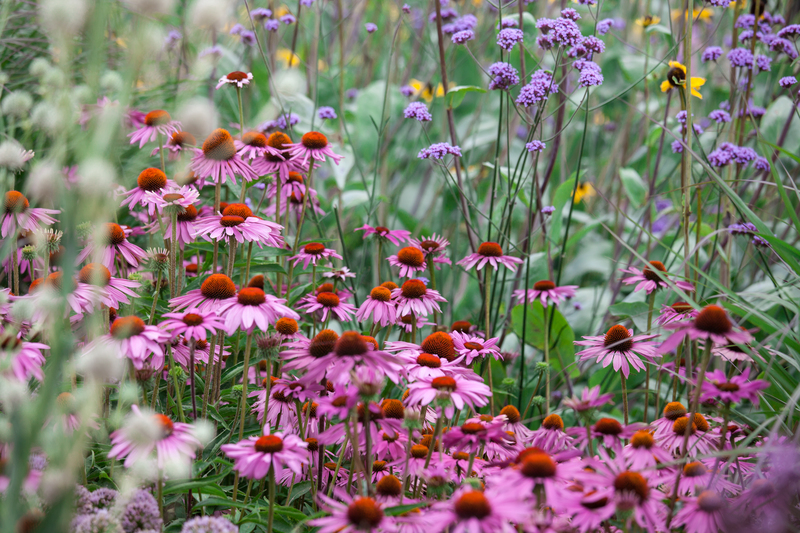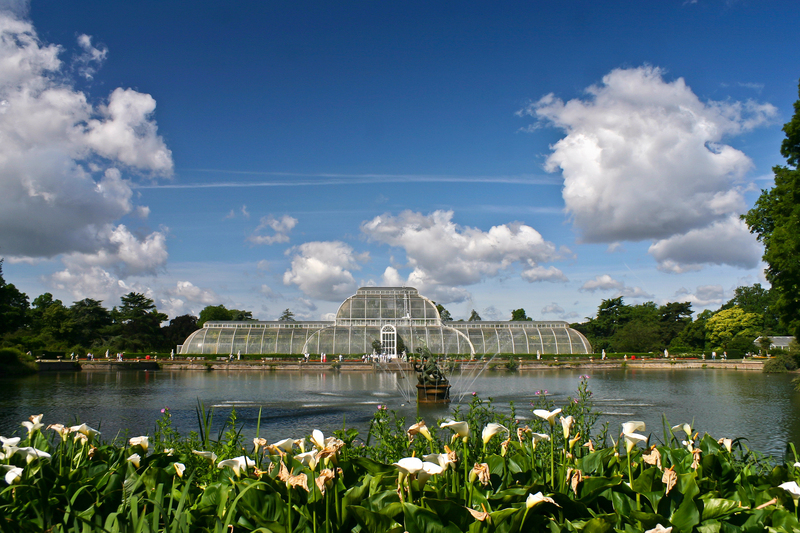Revolutionize Your Garden to Fight Climate Change
Posted on 09/10/2025
As global temperatures rise and weather patterns become increasingly unpredictable, people everywhere are searching for sustainable solutions. What if you could make a real difference in the fight against climate change right in your own backyard? Revolutionizing your garden is one of the most accessible and impactful actions homeowners and communities can take. Transforming your outdoor space into a climate-friendly oasis not only supports the environment, but also creates a healthier, more resilient place to live.
Why Gardens Matter in the Battle Against Climate Change
Your garden is more powerful than you might think. Gardens act as micro-ecosystems that can draw down carbon, support pollinators, conserve water, and reduce waste. Every thoughtfully chosen plant and eco-friendly practice adds up--multiplied across neighborhoods and communities, the impact can be enormous.
- Carbon Storage: Plants, trees, and healthy soils naturally absorb and store carbon dioxide, the major greenhouse gas fueling climate change.
- Urban Cooling: Green spaces moderate temperatures and reduce the "urban heat island" effect that plagues cities and suburbs.
- Biodiversity: Climate-smart gardens attract and provide habitat for pollinators and wildlife under threat.
- Water Conservation: Innovative garden designs minimize water use and help manage heavy rainfall, preventing erosion and flooding.

Transforming Your Garden: Sustainable Practices That Make a Difference
If you want to revolutionize your garden to combat climate change, it's time to adopt novel and science-backed gardening techniques. Here are the key strategies to turn your land into a climate champion:
1. Embrace Native and Climate-Resilient Plants
Switching from exotic, high-maintenance lawns and ornamentals to native plants is one of the most powerful steps you can take. Local species are more adapted to your region's current climate and forecasted changes, from droughts to floods.
- Low Water Needs: Native plants require less watering and fertilizer, cutting down on resource use and limiting harmful runoff.
- Pest Resistance: Indigenous species are naturally resistant to local pests and diseases, reducing or eliminating the need for chemical pesticides.
- Wildlife Support: They provide essential food and shelter for native bees, butterflies, birds, and other pollinators.
Consult with local horticultural societies or native plant nurseries to find the best plants for your area.
2. Rethink Your Lawn
Traditional grass lawns are notorious for high water use, chemical inputs, and frequent mowing (which generates emissions). Instead, consider:
- Replacing all or part of your lawn with low-growing ground covers, drought-tolerant grasses, or a wildflower meadow.
- Allowing portions of the lawn to "go wild" and grow longer for increased biodiversity.
- Planting carbon-sequestering trees and shrubs to maximize absorption of greenhouse gasses.
3. Practice Regenerative Gardening and Soil Health
Healthy soil is critical in the fight against climate change. Soil stores more carbon than all the world's plants and atmosphere combined! Unfortunately, common gardening practices can deplete soil carbon. Try these regenerative techniques:
- No-dig gardening: Avoid tilling, which releases stored soil carbon and disrupts soil life.
- Composting: Turn kitchen scraps and garden waste into rich compost, feeding soil microorganisms and enhancing soil structure.
- Mulching: Cover bare ground with organic mulch to lock in moisture, suppress weeds, and gradually feed the soil.
- Crop rotation: Vary the plants you grow in each bed to prevent disease, enrich the soil, and reduce the need for fertilizers.
Did you know? A well-managed organic garden can capture and store significant amounts of carbon--truly turning your soil into a climate change solution.
4. Water Wisely
Climate change brings more unpredictable rainfall and longer droughts. Modern, eco-friendly gardens use smart water management to withstand these extremes:
- Install a rain barrel or cistern to harvest rainwater for irrigation.
- Create rain gardens--shallow basins planted with water-loving native plants--to absorb and filter runoff naturally.
- Replace sprinkler systems with efficient drip irrigation.
- Choose permeable surfaces such as gravel, mulch, or permeable pavers for paths and patios, reducing runoff and replenishing groundwater.
5. Foster Biodiversity and Support Pollinators
Eco-friendly, climate-resilient gardens are alive with bees, butterflies, and birds. Climate change is putting these vital species at risk. Here's how to help:
- Plant diverse flower types that bloom at different times to provide food year-round.
- Avoid pesticides and herbicides that harm pollinators and beneficial insects.
- Create "bee hotels" and birdhouses to offer shelter and nesting spots.
- Leave standing dead wood and some leaf litter to support beetles, moths, and fungi.
6. Grow Food to Cut Carbon Footprints
Producing your own fruits, vegetables, and herbs dramatically lowers your carbon footprint. Home gardens:
- Eliminate the need for long-distance transport and packaging of store-bought produce.
- Allow you to compost organic waste back into your own soil.
- Encourage seasonal, plant-rich diets--a major win for personal and planetary health.
TIP: Try companion planting, permaculture methods, or edible landscaping to maximize yields while supporting biodiversity.
7. Plant Trees and Shrubs for Shade, Shelter & Carbon Capture
Trees are among the most effective long-term climate change fighters. They serve as "carbon sinks," absorbing carbon dioxide for decades or even centuries. Enhancing your garden with trees and shrubs provides multiple benefits:
- Shade: Reduces home energy use in summer.
- Windbreaks: Offer protection to gardens and homes, cutting heating loss.
- Nesting habitat for birds and small mammals.
- Beauty, privacy, and higher property values.
Choose species that are *climate-resilient*, suited to your local environment, and diverse to protect against future pest or disease outbreaks.
The Power of Community and Urban Gardens in Climate Action
Your impact multiplies when you collaborate. Urban and community gardens are thriving worldwide, bringing sustainable gardening for climate change to shared spaces:
- Transform neglected lots or schoolyards into productive green spaces.
- Grow food for local food banks and families in need.
- Share tools, seeds, and expertise, reducing waste and expenses.
- Educate neighbors and children about sustainable gardening for a healthier future.
Research shows urban gardens not only sequester carbon but also build community resilience in the face of extreme weather, food shocks, and social disruptions.
Smart Gardening Tools and Technologies for the Future
Modern technologies can help maximize your garden's climate benefits. Here are a few options:
- Soil sensors that monitor moisture, helping save water.
- Smart irrigation controllers that only water when necessary.
- Solar-powered garden lights and equipment to minimize fossil fuel use.
- Apps to identify native plants, track biodiversity, and guide planting schedules for changing climates.
Innovative Garden Design: Climate-Positive Landscaping
Redesign your garden layout to maximize climate benefits:
- Layered canopies (trees, shrubs, ground covers) for cooling and carbon storage.
- Rainwater swales and permeable paving for water catchment.
- Hedgerows for habitat and wind protection.
- Pollinator strips along fences or driveways.
Barriers and Solutions: Overcoming Common Gardening Challenges
Myth: Small Gardens Don't Matter
Even a tiny courtyard or balcony can be climate-transformative. Container gardening, vertical gardens, or mini-raingardens have a multiplied impact in urban areas where green space is scarce.
Myth: Eco-Friendly Gardens Are Harder or More Expensive
Not true! Many sustainable gardening techniques reduce labor and costs over time. Start small--replace a patch of lawn or add a compost bin. Community seed swaps and tool libraries can further cut expenses.

Measuring the Impact of Your Climate Change Garden
It's empowering to see your own results. Track the benefits your garden brings:
- Monitor water and energy use before and after changes.
- Take photos to record increases in biodiversity and plant health.
- Log how much produce or compost you create.
- Share your journey on social media to inspire others.
Supporting Science and Global Action
Many scientific organizations offer citizen science projects to track pollinators, bird species, or even local temperatures. Your climate-smart garden can feed essential data to researchers and policymakers worldwide.
Revolutionize Your Garden for a Cooler, Greener Tomorrow
Gardens are not just personal refuges--they are frontlines in the fight against climate change. By choosing sustainable gardening practices, adopting resilient plantings, maximizing biodiversity, and managing water and soil health, you become a vital part of the solution. From city balconies to suburban backyards, every patch of green can help heal the climate.
Ready to revolutionize your garden and help fight climate change?
- Start with one eco-friendly step this season.
- Share your knowledge and enthusiasm with your community.
- Continue learning, adapting, and growing--nature is always changing, and so can we.
Together, we can revolutionize our gardens--and our world--for a sustainable, resilient, and beautiful future.

